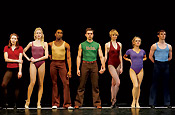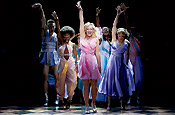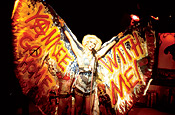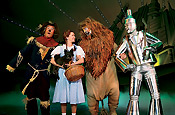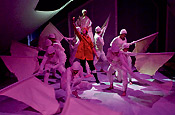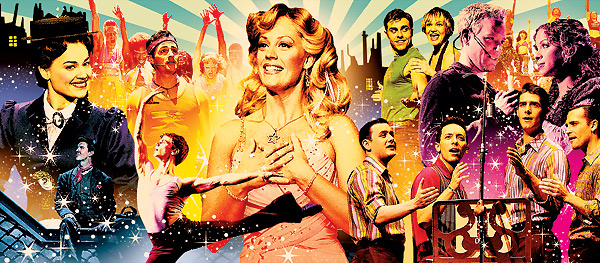
| ART OF SURVIVAL Audiences are still flocking to musicals. Here are five picks from our critic |
|
|
|
|
|
|
|
|
|
|
On the evening of January 25th, the lobby of the Oriental Theatre on Randolph Street was dark. Earlier that day, the Wizard of Oz had sailed away in his balloon for the final time. After three and a half years and $206 million in ticket sales, the Chicago run of Wicked was over.
But nearby, the Loop theatres were still hopping. Around the corner, the Goodman Theatre was hosting the press preview of Desire Under the Elms, starring Brian Dennehy. A few blocks away, the Jersey Boys showed no signs of leaving. While The New York Times had recently reported that “New York theatre appears to be entering one of its darkest periods,” and Variety had just described “recession-ravaged roadshows madly cutting midseason costs,” in Chicago, it looked as if the downtown scene was still surviving. Maybe even thriving.
In fact, a survey conducted by the League of Chicago Theatres in January and February found that ticket sales at half of the city’s theatres were either up from the previous year or steady. (Among the theatres where sales dropped, more than half blamed factors such as bad reviews rather than the economy.) The city’s largest commercial theatre operation, Broadway in Chicago, expects to sell 1.7 million tickets this year, about the same number it has sold in each of the last two years, with revenue increasing slightly, to about $100 million, according to Eileen LaCario, the company’s vice president.
So why is Broadway in Chicago leading a charge to give state tax breaks for commercial shows? Its president, Louis Raizin, wants Illinois to create a theatre incentive similar to the one that movie producers get for filming here. The tax credit is designed to lure pre-Broadway tryouts—shows such as The New Mel Brooks Musical: Young Frankenstein, which went to Seattle in 2007. (Raizin blames Chicago’s high labor and marketing costs for that loss.) The credit would also target marathon shows like Wicked.
“If the tax credits had been in place for Wicked, the show could have been around another two years,” Raizin says. While Wicked was profitable, keeping it going for so long took a big investment. Raizin says the show’s producers decided to quit while they were ahead, after looking at box-office numbers and calculating that revenue would soon trail off.
This November, the high-profile musical The Addams Family begins a pre-Broadway run at the Oriental. “Chicago is not necessarily the cheapest, but it is, in my mind, maybe the best,” says Stuart Oken, CEO of Elephant Eye Theatrical, which is producing Addams. Oken says the tax credit would be most effective as an inducement for long-running shows. “Let’s say [it] kicked in after you stayed 12 months,” he says. “That’s an incentive to stick around.”
State representative Ken Dunkin (5th), a Chicago Democrat, plans to introduce the tax-credit bill this year. He argues that, while producers would benefit, so would businesses near theatres. “Think of Michigan Avenue. Think of all those shops,” he says.
The proposal outrages John Tillman, CEO of the Illinois Policy Institute. “It’s a classic example of the government picking the winners and losers,” he says. “If we just lowered our overall tax burden . . . everybody would benefit.” The House majority leader, Barbara Flynn Currie (25th), is also skeptical. “This is not an easy time to ask for this kind of a tax break,” the Chicago Democrat says, pointing out the $9-billion hole in the state budget. “I don’t see any evidence that there is a problem getting good, solid Broadway shows to come to Chicago. We’ve got the audience.”
Why is the local scene faring better than theatre elsewhere? LaCario says Chicago has two advantages: First, Chicagoans are in the habit of going to the theatre. Even an economic downturn won’t break that routine for many stage fans. Second, Chicago is the destination for Midwest travel. People in places like Milwaukee and St. Louis may be scaling back on their vacation plans—driving to Chicago and seeing a show instead of flying somewhere more distant.
As originally written, Dunkin’s bill would cover any commercial show in a theatre with more than 1,200 seats that runs more than eight weeks or goes to Broadway within a year after its Illinois run. The producer would receive a credit equal to 20 percent of marketing and labor costs, plus 15 percent of labor costs for any workers who lived in high-poverty areas. As proposed, smaller theatres wouldn’t benefit directly from the tax credit. But Goodman Theatre’s executive director, Roche Schulfer, says it would boost the whole community. “A small amount of government money stimulates a lot of activity,” he says. (House speaker Michael Madigan has not taken a position on the bill, but Madigan’s spokesperson, Steve Brown, says the measure faces long odds. “Given the state’s financial position, I’m guessing that new tax credits aren’t going to be popular this year.”)
Robust audiences aside, the League of Chicago Theatres points out that, in its recent survey, local operators were worried about the long-term effects of the puny economy. Many had concerns about losing corporate and foundation funding, and half planned to cut their budgets in the next fiscal year. The first thing to go? Marketing, says the League’s Deb Clapp. “So then what happens? They don’t sell as many tickets, and it goes into a spiral,” she says. “It’s just a very precarious place to be.”
Illustration by Sean McCabe
Photography: (in Illustration, Jersey Boys and Mary Poppins) Joan Marcus; on sidebar: Paul Kolnik; Carol Rosegg; © 2001 Courtesy of New Line Productions, Inc.; Joan Marcus; Michael Brosilow



